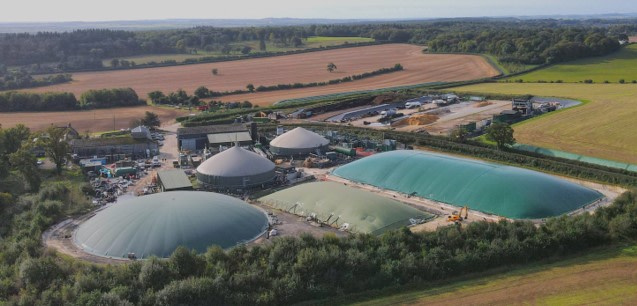The field to mulch bag process


- Arable crops of maize, barley, rye, oats and grass are grown at our farm and partner farms
- Harvesting of the arable crops. Harvest takes place annually from July to November
- The harvested crops are fed into Ag-bags, sealed long plastic tubes used for ensilement
- The crops are stored in Ag-bags in a field for up to 12 months. The silaging process takes around 6 weeks
- The ensiled crops are loaded and transported back to the farm then fed into the anaerobic digesters.
- A biodigester acts like a cow’s stomach to break down crops. Biogas is produced including methane and CO2
- Biomethane gas produces renewable green energy for export to the National Grid, heating around 8,500 homes
- A co-product of the biogas production process is digestate, used as a soil improver/ fertiliser
- The solid digestate is sold as soil improving mulch which is 100% sustainable, peat-free and approved for organic use
- The liquid digestate is sold as a fertiliser, approved for organic use and free from peat and waste
- Sustainable CO2 is a co-product of biomethane production. Our food-grade, high quality liquid dioxide is ISO approved. Read more here





Sustainability is at the heart of Apsley Farms
• Biogas is 100% renewable and carbon-neutral, preventing the release of methane into the atmosphere with a positive impact on the environment
• Our activities have reduced the UK’s energy-related CO2 emissions from gas by around 140,000 tonnes of CO2 since 2014
• With a carbon footprint of around 5% of ‘natural gas’ (i.e., savings of 95%) our biomethane production provides a sustainable fuel to meet the UK’s energy needs and climate targets

About Apsley Farms
Sustainability and efficiency are at the heart of everything we do at Apsley Farms. Embracing cutting-edge technologies, we have transformed low-value crops into renewable energy. Furthermore, we’ve focused on operating within a circular economy, notably by returning the nutrients in our digestate products back to the land as a fertiliser.
Our process of generating green gas and other important by-products achieves three critical objectives: Firstly, it displaces natural gas (fossil fuel) in the gas grid to heat people’s homes; secondly it displaces CO2 produced by the fertiliser industry, which is essential in the food industry thirdly it simultaneously generates natural fertiliser in the process!
